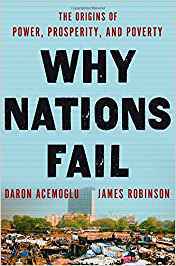
Why Nations Fail: The Origins of Power, Prosperity and Poverty (2012) explores global inequality and wealth creation. But does the book neglect the intellectual and cultural roots that determine its institutional model?
Economists Daron Acemoglu and James A. Robinson argue that the disparity between rich and poor countries isn’t primarily cultural, geographical or inept domestic rulers per se, but rather differences in institutions that incentivize productivity and ensure stability. Although this institutional argument has been thoroughly advanced in the latest decades, the authors doesn’t shy away from the good marketing scheme of labeling it a “new theory”. At any rate, the book blends modern history, political theory and macroeconomics in a strong case against its rival theories.
First an early confession: I must give Acemoglu and Robinson credit for reinforcing one of my fixed predispositions, namely that the historical source of national wealth is structural and not geographical. They provide numerous examples of wealth gap between neighboring populations with similar natural resources and cultural heritage, the most pivotal being the differences in quality of life between Nogales, Mexico and Nogales, Arizona.
The structural shortcomings of these various regional examples are connected by excessive political corruption. Indeed, the left should look no further to find a true manifestation of trickle down, as corruption on the top necessarily spreads to all facets of society, demolishing social trust and establishing an economic system based on shortsighted egoism.
Whether public functionaries are incentivized to steal or to honestly serve to be a part of the political system is certainly an institutional issue. Yet, despite fancying itself as non-academic, the book stumbles in the same traps as the theories it criticizes: it separates institutions from the culture they operate. In Acemoglu and Robinson’s narrative, the institutional framework influence cultural characteristics in a one-way causality.
Now, I’m generally also guilty of an overly structural approach by upholding private property rights as the ultimate institutional framework determining prosperity or the lack thereof. My reason is that a private property order incentivizes pro-social behavior: personal growth, responsibility and reputation, stable nuclear families, and local and voluntary solutions to social challenges.
In short, I tend to view property rights as the foundation for a healthy culture. Yet this theoretical frame is similarly inequitable as Why Nations Fail’s institutional argument if one neglects that the very respect for private property is culturally facilitated through a preliminary acceptance of ideas that once were unpopular.
Consider, for example, the unenthusiastic response to John Locke’s Two Treatise of Government (1689), a critical work for the progression of the Revolution of 1688, which Why Nations Fail upholds as the institutional basis for the West’s commercial ascendancy. The non-juror Charles Leslie sneered at Locke’s concept of individual sovereignty and consent: “Would they send men about to poll the whole nation?”[1] Even in the nineteenth century, a common retort to J.S. Mill’s On Liberty was that universal personal freedom was barbarous.
It was these ideas, or, more precisely, their implicitly embedded legacy, that spurred America’s Westward Expansion. Those early Europeans settlers were equipped only with a cultural framework, only later did United States’ institutional framework emerge. People who emphasize this “cultural hypothesis” don’t, to my awareness, argue that poorer citizens “lack the same sort of work ethic”, as Acemoglu suggest. The emphasis is rather on the common ideas for the formation and endurance of stable institutions.
Why Nations Fail was published at the very dawn of the Arab Spring. Five years later, it’s clear that the protestors’ initial anti-corruption demands have not materialized, and the prospect for more political freedom in the region’s foreseeable future looks increasingly dim. Demanding less corruption is only a meager beginning; favoring ideas that, if enacted, would limit corruption is another leap.
The usual cycle of revolutions is that new rulers merely replace the corruption of the old. The simple brilliance of the Magna Carta of 1215, which the Western world has profited from ever since, is the realization, formulated by Lord Acton, that power corrupts and absolute power corrupts absolutely. This document’s ideas have long outlived its institutional construct. It is similarly only the highest respect for the individual that can spur institutions that alleviate people from poverty and increase the masses’ quality of life.
[1] Leslie, “The New Association of those Called, Moderate-Church-men”, part II, London, 1703.
Share this:




